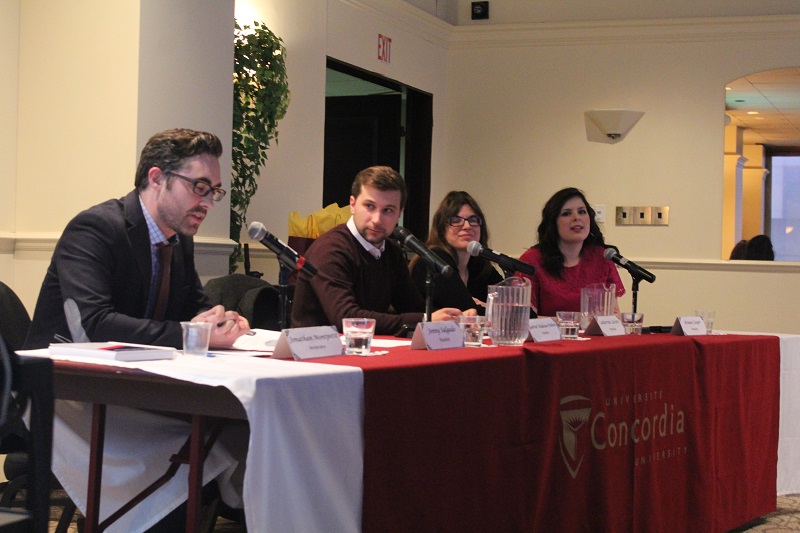Panelists discuss the importance of preserving French in Quebec and how to do it
“This is very Montreal, braving a snowstorm to come talk about language,” said the panel mediator, CBC web journalist Jonathan Montpetit to the crowd of attendees.
Indeed, Montrealers powered through the storm on the evening of Tuesday, Mar. 14 to attend the School of Community and Public Affairs (SCPA) panel on the changing landscape of language in Montreal.
The panel featured Gabriel Nadeau-Dubois, the co-spokesperson of Coalition Large de l’Association pour une Solidarité Syndicale Étudiante (CLASSE), Catherine Leclerc, McGill professor from the department of French language and literature, and Ariane Cayer, the former president of the Conseil National des jeunes du Parti Québécois.
The panelists discussed Montreal’s identity in terms of language, and ways the French language could be further protected in the province and across the country.
Nadeau-Dubois described Montreal as the “North American capital of the French.” He said, while the anglophone community has a historical and future role in contributing to the city’s culture and politics, Montreal’s culture is first and foremost francophone. Nadeau-Dubois was involved in the 2012 Maple Spring student protests, and is now entering politics, running for Québec Solidaire for the Gouin riding.
Leclerc, whose thesis focused on plurilingualism in literature in Canada, said while there are perceivable tensions between anglophones and francophones in Montreal, having coexisting languages “has a potential for incredible creation. Montreal is one of the rare places where you see reciprocity between these linguistic exchanges.” She views the two languages as complementary rather than battling each other.
Nadeau-Dubois argued that, at the individual level, speaking and mixing many languages is an advantage. Not only does it open more opportunities in the workplace, but it will also open up the individual to more cultures, he added. On the other hand, he said, at an institutional level, it is important to use one language to unify the institution for democratic reasons. Democracy is not simply about following the same laws—it also deals with the “sharing of a common public space and a common language,” said Nadeau-Dubois.
Leclerc argued that a language dies when faced with two elements. The first element is when it is only spoken in private realms. The second element is when people refrain from using a language because they don’t believe it’s being used properly. Leclerc argued as long as public institutions function in the language that needs to be preserved, there is no real threat of losing that language.
Nadeau-Dubois said a common misconception about French Quebecers fighting to promote their language and culture is that they are the only ones fighting that battle. He said a large number of cultures around the world are facing the same battle, that are also “in a position of vulnerability vis-à-vis the American culture.”
The panelists also explored the tough labour market in Quebec for non-bilingual residents. Cayer and Nadeau-Dubois agreed when it comes to the international labour market, speaking English is easier. But, “in Montreal, the language between an employer and an employee is French,” said Cayer.
Nadeau-Dubois and Cayer said francization, the process of integrating newcomers into Quebec by teaching them French and about Quebec’s culture, should be more accessible and accommodating, as a means of integrating immigrants into Quebec’s labour market.
The panelists also discussed the controversial Bill 101, also known as the Charter of the French Language. The bill, whose goal is to promote French culture and language, made French Quebec’s official language 40 years ago. Students must attend elementary and secondary school in French, unless at least one parent completed their education in English. When it was first introduced, the bill was controversial. Leclerc argued “it’s still referred to as Bill 101, not law 101 … It shows that, if it was authoritarian in intention, it never succeeded at being authoritarian, and to me that is not a problem. It works probably better not being authoritarian, but being simply the rebalancing of powers.”
“In the context of cultural pluralism, the use of a common language is of essence. Globalization does not make the bill obsolete. In fact, I think it makes it more pertinent than ever,” said Nadeau-Dubois, commenting on the usefulness of the bill today.
Cayer said federal law should further protect the language rights of francophones because, while francophones are the majority in Quebec, they are a minority in the rest of Canada. She suggested making Bill 101 quasi-constitutional to give it more significance.
While Montreal has come a long way in accepting Bill 101 and protecting minority languages, the panelists agreed there is still a lot of work to be done. They said Bill 101, today, is a safeguard against a global culture and new platforms like social media. Fighting to protect a minority culture is not a weakness Leclerc concluded. Rather, it translates into a “specific way of life and solidarity.”
